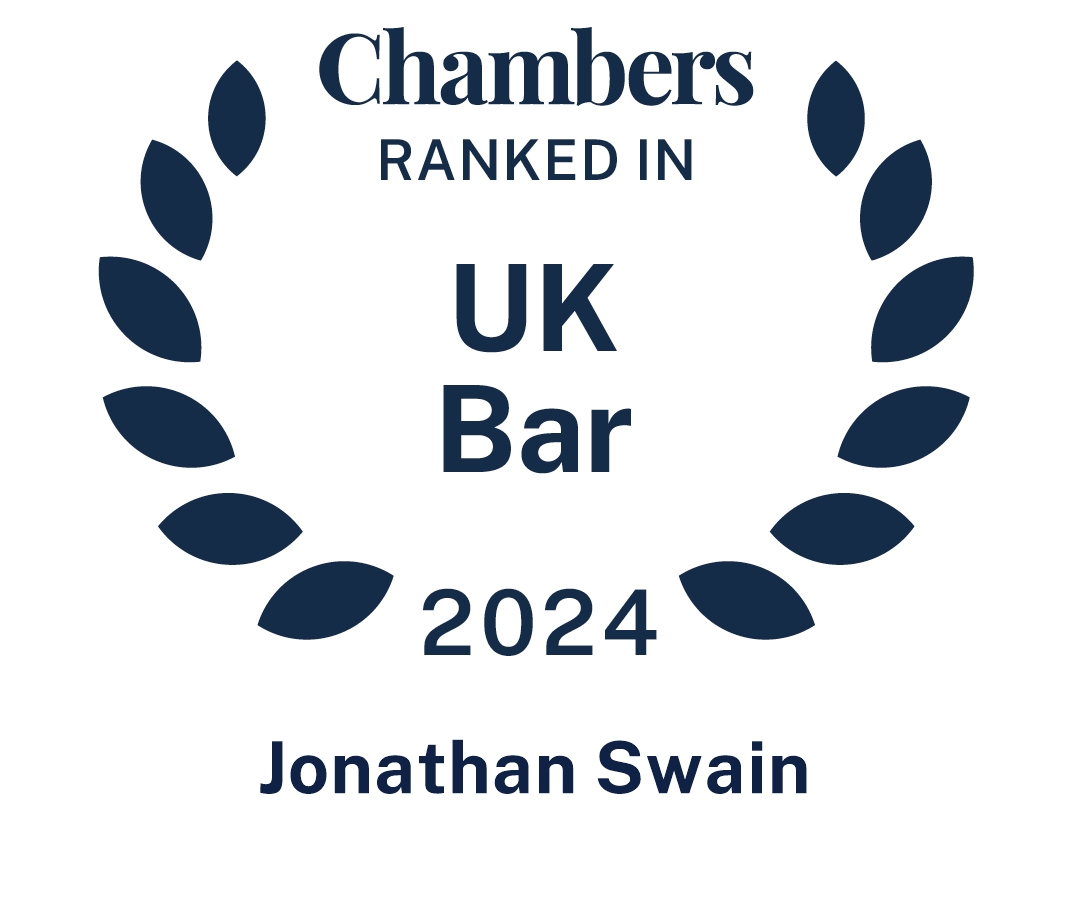Jonathan Swain
introduction
Jonathan is a specialist extradition barrister, who is listed in the Legal500 and Chambers and Partners for his work in this area. He regularly appears at Westminster Magistrates’ Court, and on appeal at the High Court, and he represents both Requested Persons and Judicial Authorities. He is a regular contributor to CrimeLine’s Extradition Hub and has written extensively about the changes to extradition following Brexit.
He also undertakes work for the GLD as part of the Attorney General’s civil panel, including advising on unlawful detention cases and matters arising out of Covid19 regulations.
Jonathan is Grade 3 on the CPS specialist extradition panel, Grade 2 on the CPS advocate panel for general criminal work, and a member of the Attorney General's list of civil panel counsel (C panel).
BACKGROUND AND EXPERTISE
Jonathan spent 18 months in the Extradition Unit at the CPS where he gained considerable expertise in extradition proceedings. After leaving the Unit, he quickly developed a busy practice both prosecuting and defending in extradition cases. He has been involved in a number of leading cases, including appearing in the Supreme Court.
Jonathan also has considerable experience of mutual legal assistance, including the European Investigation Order, and transfer of sentences.
Prior to starting in extradition work, Jonathan was a Senior Crown Prosecutor for the CPS, where his diligent preparation and robust advocacy meant that he was instructed to act in difficult and serious cases. He gained extensive experience in all types of cases in the Magistrates’ and Youth courts, encompassing work from theft to sexual offences. Since moving to chambers, he has been instructed in a range of cases, both prosecuting and defending. He has also been instructed by various local authorities.
NOTABLE CASES
Instructed for the requested person in this 'part 2' request. It is alleged that Mr Ahearne, together with two others, stole three items from the Ming dynasty era (14th-15th century) valued at USD 3.58 million from Geneva, one of which was subsequently auctioned in Hong Kong resulting in the identification of the suspects.
Extradition is being opposed on the basis of rights under the European Convention on Human Rights, and forum.
Acting for the Appellant. The Appellant argued that his extradition to Poland would be disproportionate given the impact it would have on his partner, with particular focus on her alcoholism and her reliance on him. The Court quashed the order for extradition and discharged the Appellant.
Acting for the Appellant. The Court considered grounds raised pursuant to section 12A of the Extradition Act 2003 (decision to charge and try), and Article 8 ECHR. In light of the severe medical condition of the Appellant’s husband, which had worsened since the extradition hearing, the court quashed the order for extradition, and discharged the Appellant.
Led by Helen Malcolm QC for the Appellant. The Appellant argued that the conduct in the warrant did not meet the requirements of dual criminality, and that the decision in R v Rogers [2014] EWCA Crim 1680 on the extraterritorial nature of money laundering offences was a matter needed further examination by the Supreme Court.
Permission granted on s20 EA 2003, namely that a person who had mandated a lawyer to represent him, but who was personally prevented from attending should not be deemed present at his trial through that lawyer. Where an ex officio lawyer attends without instruction, the person should not be deemed present .Potentially instructive principles in other cases.
The Romanians have previously sought extradition of the Appellant from the USA, who declined to extradite him as he was acting as an informant. However, romania proceeded to try him in his absence, despite protestations that he wished to be presented at his trial.
Acting for the Respondent. The Court considered whether extradition was disproportionate in the circumstances, and addressed the impact of Brexit, the factors to be considered under the proportionality exercise, and the status of the appellant’s evidence of the circumstances of the offences.
Led by Jonathan Hall for the Respondent. ‘Leading’ case before the Divisional Court in respect of Latvian prison conditions and whether they placed extraditees at a real risk of a violation of Article 3ECHR
Acting as junior counsel for the Respondent. The first case to have been referred from the English courts to the CJEU in extradition proceedings. The issue referred relates whether a public prosecutor can be an issuing authority in circumstances where a Court has no oversight of the domestic arrest warrant or EAW prior to surrender. The referral is currently pending.
Acting for the Appellant. It was argued that the Appellant had not been deliberately absent in circumstances where, though he had breached his bail conditions, it had not been possible to proceed to trial in absence at the time. The subsequent change in law could not have reasonably been envisaged, so the Appellant could not have unequivocally waived his right to appear.
Led by John Hardy Q.C. for the Respondent. The Supreme Court considered whether an individual who has been convicted, but where the conviction is not final because he has an unequivocal right to a retrial after surrender, is "accused" pursuant to s.14(a) of the Extradition Act 2003 or "unlawfully at large" pursuant to s.14(b) for the purposes of considering the "passage of time" bar to surrender.
Led by Mark Summers QC for Mr Balasz. The Appellants argued that their extradition would amount to a real risk of a breach of their Article 3 Convention rights due to the prison conditions in Hungary.
Representing two requested persons facing extradition to Belgium in respect of high value theft offences. Both were discharged on the basis of section 12A. In addition, M was discharged on the basis of Article 8 ECHR on the basis of particular mental health vulnerabilities.
The requested person had previously been the subject of extradition proceedings from Greece for the same matters, and had her sentence transferred to Greece where it had been served in full. The warrant was discharged on grounds of Article 8, double jeopardy and abuse of process.
Representing the Appellant in a successful appeal against the order for extradition on the grounds of proportionality. The Court held that, for the purposes of the Extradition Act 2003 s.21A, the requesting judicial authority bore the burden of detailing the seriousness of the extradition offence and what the likely penalty would be. In this case, they had not done so and so the appellant should be discharged.
Led by Julian Knowles QC for the Respondent. The Divisional Court considered the powers of the court to admit fresh evidence of the respondent on appeal which was relied upon to uphold the decision of the district judge, and concluded that it could do so in the interests of justice. The Court also rejected the arguments of the appellant that the District Judge had erred in his conclusions in respect of sections 2, 10, 14 and 21 of the Act. The appeal was dismissed.
Acting for the Respondent judicial authority. The Court held that a distinction could be drawn between a requested person trying to undermine a warrant by adducing evidence, and the district judge taking into account his evidence for the purposes of establishing dual criminality. The decision of the District Judge was therefore a proper one, and the appeal was dismissed.
Appearing for the Respondent judicial authority as a lone junior before the Divisional Court. The Court upheld the decision of the district judge to order the extradition of the Requested Person.
Extradition sought to be prosecuted for child rape and murder committed on 25 to 26 June 2021 in Vienna, which was the subject of widespread press coverage in the Uk and abroad. The requested person initially argued that he was not the individual whose surrender is sought, pursuant to s7 EA 2003. That argument failed.
At the substantive hearing, the Requested Person argued extradition was barred by section 12A EA 2003, namely no decision to charge or try the requested person, relying on expert evidence.Extradition was ordered, rejecting the grounds advanced.
To be heard before a Divisional Court in respect of Article 3 ECHR. Based on expert evidence, Romanian legislation, and decisions of the ECtHR, the Appellants argue that Romanian prison assurances (provided in all Romanian extradition cases) require additional details for quarantine period in Rahova, and that the assurances provide only a guarantee of 3sqm of space. They do not provide any assurance on material detention conditions.
Other cases are being stayed behind this leading case, as it arguably applies to every individual facing extradition in Romania.
directories recognition
"Jonathan Swain gives clear, cogent arguments to the court." (Chambers UK, 2024)
"Jonathan Swain delivers well with his oral submissions in court, and is also excellent in terms of his written submissions." (Chambers UK, 2024)
"Jonathan is regularly involved in difficult cases and proves unflappable in court. He is excellent with his clients and exudes a confidence that helps put them at ease."
"When it comes to proceedings, he always has his finger on the pulse. A very good advocate who is switched on when both prosecuting and defending." (Chambers UK, 2023)
"Jonathan is a savvy, user-friendly and confident advocate." (Legal 500, 2023)
"He has a thorough knowledge of extradition law and practice. Mr Swain prepares clear and structured skeleton arguments and advices. I am frequently impressed by his ability to articulate these arguments orally in court. He is very persuasive and knowledgeable. He is a thorough and authoritative advocate."(Legal 500, 2021)
"A brilliant advocate and tactician. Jonathan is always a pleasure to work with and a rising star among the Extradition Bar." "He is an able, clever advocate with very good knowledge of the law, who is both fair in his handling of prosecution work and very passionate when defending." (Chambers UK, 2020)
"He is good on the technical detail, he doesn't take bad points, and he always adopts a sensible view of cases." Chambers UK, 2020
"A staunch advocate who is very knowledgeable on extradition matters" Legal 500, 2020

PROFILE: Jonathan Swain
Year called
2010
Specialisms
Crime
Crime
International
International
Extradition
Extradition
Direct access
Yes
Contact
0207 489 2727
Education
BVC, BPP Law School (2010)
MA in International Criminology, University of Sheffield (2009)
LLB in Law and Criminology, University of Sheffield (2008)
Memberships
Criminal Bar Association
Defence Extradition Lawyers Forum
Appointments
CPS Extradition Panel (Grade 4)
CPS Panel (Grade 2)
Attorney General's list of civil panel counsel (C panel)
Recognition










